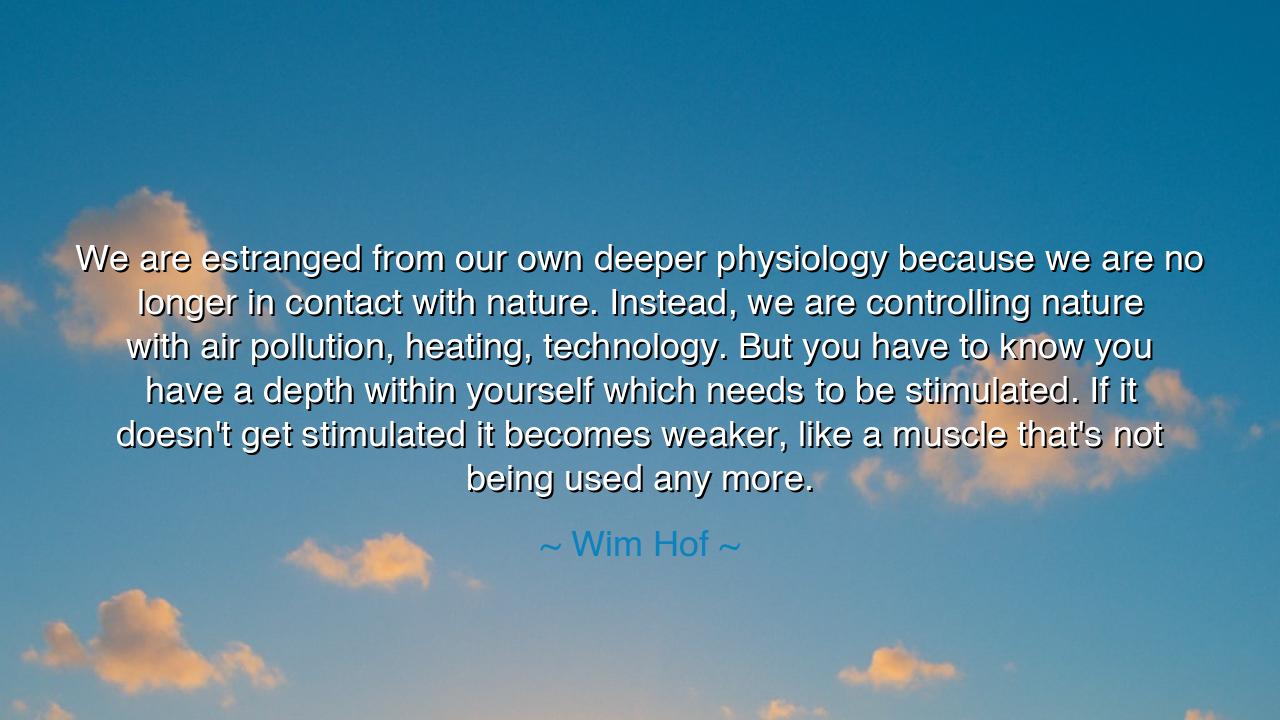
We are estranged from our own deeper physiology because we are
We are estranged from our own deeper physiology because we are no longer in contact with nature. Instead, we are controlling nature with air pollution, heating, technology. But you have to know you have a depth within yourself which needs to be stimulated. If it doesn't get stimulated it becomes weaker, like a muscle that's not being used any more.






Hear the cry of Wim Hof, the man called The Iceman, who plunged himself into cold waters and scaled frozen peaks to remind humanity of its forgotten strength: “We are estranged from our own deeper physiology because we are no longer in contact with nature. Instead, we are controlling nature with air pollution, heating, technology. But you have to know you have a depth within yourself which needs to be stimulated. If it doesn't get stimulated it becomes weaker, like a muscle that's not being used any more.” In these words lies both a warning and a promise—the warning that comfort has dulled us, and the promise that within us lies a hidden well of power waiting to be awakened.
The origin of this saying comes from Hof’s life itself, forged in extremity and discipline. He entered the cold not for vanity but for survival of spirit, discovering that in deliberate exposure to the raw forces of the earth, the body awakens, the mind clears, and the soul grows resilient. What he teaches is not merely about cold water or breathwork, but about a return to nature—to that wild communion with the earth that has shaped humanity for millennia. Where modernity builds walls against discomfort, Hof tears them down, declaring that the human depth must be stirred, lest it fall into weakness like an unused limb.
Consider the old tribes of the north, who walked barefoot on snow, who hunted in storms, who endured winters where warmth was rare. They did not live as strangers to their own flesh; they knew their lungs, their skin, their very blood could adapt. In that communion with hardship, they forged bodies that could endure, and spirits that could thrive. But now, wrapped always in heat and convenience, man forgets this ancient truth. His body slumbers, his spirit weakens, and he wonders why anxiety, fatigue, and despair cloud his days. Hof’s words call us back to the trials that sharpened our ancestors into steel.
History itself gives testimony. When Hannibal crossed the Alps with his army and elephants, it was not technology that bore them through, but the fierce endurance of men hardened by struggle, willing to meet the mountain on its own terms. Had they been softened by endless comfort, their march would have ended in ruin. Likewise, the explorers of the polar regions, such as Roald Amundsen, survived not by bending nature to their will but by yielding to it, respecting its power, and awakening the inner physiology that allowed them to endure cold, hunger, and wind. Their triumphs are monuments to what the human body and spirit can achieve when awakened.
The teaching here is both physical and spiritual: your inner depths are not dead, only dormant. Like a muscle that withers without movement, your deeper physiology—your breath, your circulation, your resilience—will waste away if it is never tested. Comfort lulls you into weakness, while deliberate challenge—whether cold, heat, fasting, or silence—awakens forgotten power. Hof’s wisdom is thus a rebuke of a culture that hides from hardship, choosing soft couches and artificial heat over the training ground of earth and sky.
The lesson is clear: do not let your deeper self rot in disuse. Seek the cold river, the long walk, the mountain air. Learn to breathe deeply, to still the mind, to endure what is difficult. Do not despise the gifts of technology, but do not surrender wholly to them, for they cannot replace the resilience of the soul. When the storms of life come—and they always come—it is not heated rooms or screens that will save you, but the awakened depth of your own spirit and body.
So I say to you, children of tomorrow: train your inner strength. Awaken your physiology by seeking contact with nature. Let the sun burn your skin, the rain soak your shoulders, the wind carve your breath. Embrace discomfort as teacher, not enemy. For Hof speaks the truth: within you lies a muscle that must be worked—the muscle of resilience, of courage, of life itself. Strengthen it now, and you will find that when trials come, you do not break. Instead, you endure, you rise, and you remember that you are not a prisoner of comfort, but a child of the earth, bound to its wild and eternal rhythms.






AAdministratorAdministrator
Welcome, honored guests. Please leave a comment, we will respond soon